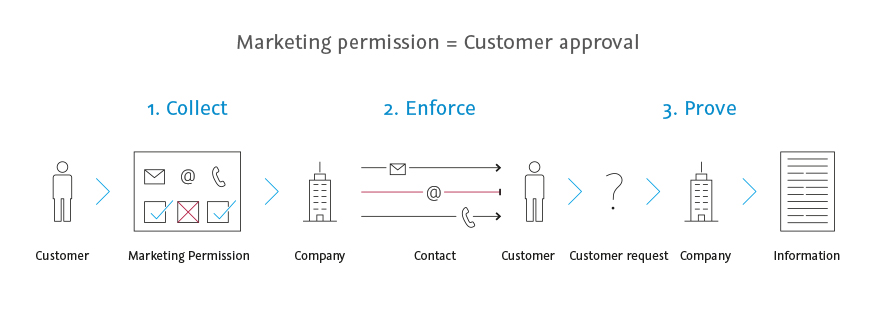Advertising, precisely placed
Consent, rejection and the right way to deal with it
When addressing customers, it has become de rigueur to respect people who do not wish to receive advertising when selecting target groups.
For more than 20 years, the German Dialogue Marketing Association (DDV) has maintained the “DDV Robinson List” to this effect. Customers can enter themselves on this list. Often, customer names are recorded here multiple times in different spellings to account for common variants used by advertisers. Here is an anonymized example from the DDV Robinson list:
Stefan Mueller
Stephan Mueller
Stefan Mueller-Graeper
Stephan Mueller-Graeper
Stefan Müller
Stephan Müller
Stephan Müller-Gräper
Stefan Müller-Gräper
With TOLERANT Match, subscriber lists for campaigns can be checked and cleansed quickly and easily via a so-called “negative match”. Similar matches are also found reliably. In this way, you avoid annoyed recipients and reduce wastage. Even with very large data volumes, processing in batch mode takes only a few minutes.
It only works with permission – Permission Marketing
Today, you need your customers’ consent for any kind of electronic or telephone advertising. Even for data analyses (e.g. prediction models about the best time to buy or for product recommendations), your customer must actively agree so that you can collect and evaluate the data required for this.
Since 1999, there has been a collective term for this in the specialist literature: “Permission Marketing”.
Its simplest and most widespread form is online newsletters, to which recipients can subscribe and unsubscribe from these. Each mailing contains a note or link for unsubscription. Further customer contacts are not permitted on this basis.
For more complex activities and also in view of the EU General Data Protection Regulation (effective since May 2018), further appropriate declarations of consent must be obtained from the customer and filed in addition to the newsletter consent. This sounds easier than it is in practice. Because several core processes must function reliably:
- Obtaining consent without gaps (marketing permissions)Here you should also know which customers have already given their consent and only ask again if no decision or consent is known to date.
- Enforcing the customer decision
In all processes of customer contact or for data transfer or data use, it must be taken into account whether the necessary consent has already been obtained. It must be possible to take account of changes in the customer’s wishes at short notice – for example, if customers demand a complete stop to all further advertising. - Ability to provide information
According to the German Federal Data Protection Act and the EU General Data Protection Regulation (GDPR), you must be able to provide information immediately about the sources of the data, the consents collected, and the use and further processing of the data in the event of queries from your customers.
In addition, the explanation texts and consent options for the consent declarations must be managed and made accessible to the various processes of customer contact – in the required languages for internationally active companies.
TOLERANT Marketing Permission Management supports you in all these tasks. It simplifies the seamless recording and application of consents (marketing permissions). Thus, TOLERANT Marketing Permission Management is the backbone for the consent management of a modern omni-channel marketing.


 Shutterstock
Shutterstock